Review-Roundup: Idol Jihen 02, Chaos;Child 00-02, Kuzu no Honkai 02
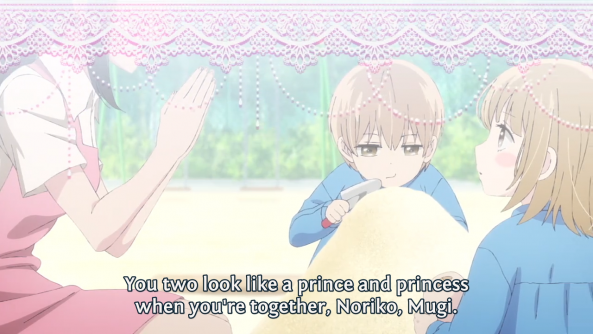
Again, Kuzu no Honkai introduces another adult who talks about weirdly idealistic romance to kids and thereby damns them to have a completely warped idea of what love actually is like.
This time I review:
Idol Jihen 02: Some shady politician in the countryside has decided to use his private land as an illegal dumping-ground for amusement-parks in Japan. The only problem: It stinks! Therefore, the courageous idols from the Sunshine party protest and… get nowhere with that. It’s only after Natsuki & Co arrives that a solution presents itself: Violate private property and repurpose it! And it’s okay because… idols! That’s why!
Chaos;Child 00-02: Imagine writing a newspaper for your school… What do you think is worth investigating? Is it the upcoming culture-festival at your school or is it maybe… a series of gruesome murders?! For Takuru the choice is easy. After all, since he has the social aptitude of a dung beetle corpses are the perfect target-demographic of his journalistic ambitions.
Kuzu no Honkai 02: And you’d think pretending to be in love would be easy…? Who could’ve guessed that love is waiting around the corner for practically everybody – and apparently it’s never the person you wish to see… or was it the person around the corner doesn’t wish to see you…? Well, who knows… Love’s really complicated, man!
Idol Jihen 02 Review:

Makes sense to me, if you ask me! Nothing weird about that, guys! I mean, how else are you gonna judge an idol’s potential… By their singing voice, maybe?! Of course not!
A show like Idol Jihen is hard to judge. In many ways, the show is simply too grotesque and too unconventional to really show any quantifiable signs of quality. As ridiculous as the premise is, the second episode is just as ridiculous in what is happening in it. Little to nothing makes sense in this second episode and the show’s attempts at a message are delivered in a rather questionable way. But with the flaws so glaring, the show’s most interesting quality is its seeming lack of self-awareness.
The scenario behind the second episode seems rather straightforward at first. One of the dirty politicians is using his private land as an illegal dumping-ground for amusement-parks around the country. Dodging the costs of legal waste-disposal, the scummy politician is once again seen making shady deals with shady people for his own gain. But idols from the Sunlight-Party oppose him because 1. it’s their hometown and 2. the garbage is hurting the environment. Natsuki, Sachie and Shizuka are also there because residents asked them to resolve this situation.
Even though this is a ludicrous series or especially because it’s a ludicrous series (depending on your point of view, I guess), a couple elements of the story stand out here. The most obvious plothook is employed here with illegal waste-disposal damaging the environment. Only in this case, it isn’t some shady cooperation that’s the problem but a shady politician. Again, the series creates an obvious contrast here by making the villain an old dude whereas the Idol-politicians are young, beautiful women. Also, the cause of environment-protection is a just one which makes it easy to identify the good guys and the villains.
What also becomes an element in this episode is the idea of the countryside as an untouched paradise. Remember the first episode and how it portrayed Natsuki’s hometown: It was an agrarian society with hardworking people who all seemed to live in a blissful harmony with nature. And this episode again relies on this notion of the countryside being this untouched natural paradise. In addition to that, the series’ solution to the garbage-problem also enforces this idea of harmony as the garbage becomes art as the residents as well as the idols express their joy through it. So, in the end, the problem wasn’t the garbage itself but the evilness of the dirty politician.
There isn’t much of a point to think rationally about this episode but still, I feel like you shouldn’t let questionable elements go just because they are in some silly company. The weirdest element of the episode is the fact that the only reason the idols have been unable to do anything about the garbage was the fact that it was on private property. And unless the environmental damage can be proven (or it can be proven that the smell is a public disturbance, I guess), none of these people have the right to turn that garbage-site into an art piece. Yet in one night-scene it’s shown how the idols have been going to the garbage-site to “clean up”. And on a side-note… “cleaning up” a garbage-site doesn’t make much sense, mind you. But anyway, the point is that you can’t just waltz onto private property because you don’t like how it looks (or smells up-close). The episode never showed the environmental damage (I doubt you could turn the real-world-cases of illegal waste-dumps into art overnight…) and the private-property-problem never got resolved.
The MO of these idol-politicians seems to be to go in with popular support against selfish individuals and then through music/positive attitude (coupled with the “right point of view”) they just brainwash whoever opposes them. In the world of this series, all it takes is a little song and dance to win an argument – which is an insane idea to put into a series about politics.
The other aspect of the series is the continuous characterization of idol-careers as some sort of battle-shounen-fighter. Remember how in the first episode, Natsuki got the position as idol through winning a race up a hill and how her potential was shown in the exhaustive training with Shizuka? This time the series ties risky bungee-jumping to how good of an idol you are. Of course, it’s a ludicrous choice but all the same, it’s noteworthy how attitude and physical power are tied together here. Just like in Naruto, Bleach, One Piece etc., power gets characterized by cheesy sentimentality and expressed in physical feats. And to somehow quantify that in the series, Idol Jihen has invented “Aura” as an amalgamation/shorthand of everything I’ve just described. Whenever the series is talking about an Idol’s Aura this is what they’re referring to.
To judge this second episode, though, I have to say that the series doesn’t go far enough in my opinion. The whole thing with the art-solution was appropriately ridiculous and the bungee-jumping was very fitting, too. What the series is still lacking is villainy that’s just as over-the-top. And it doesn’t matter if it makes no sense. The more epic these episodes will be, the better this series will fare. Like, for example, the perfect crescendo to this series would be for the Idols to somehow win a battle against the evil politicians for the cure of cancer (the evil politicians want to sell it at a high price while the Idols want to give it away for free). That’s the level of ridiculousness this series needs to get to in order to succeed in my opinion.
Episode-Rating: 5.5/10
Chaos;Child 00-02 Review:

#fakenews
Let me tell you: Distilling the entirety of Chaos;Head into 30 minutes is one of the most unpleasant experiences imaginable. What kind of idiot thought it a good idea to do a recap of an entire series in one episode?! Not only that but it was less structured like a recap and more like a super-rushed story. Of course, it made little sense, every character seemed annoying and it ended up making Chaos;Head look like the most incomprehensible piece of garbage imaginable. As a re-introduction to that universe, episode 00 was utterly unbearable.
You can understand where the idea for that recap came from, though. Chaos;Child is part of 5pb.’s Science-Adventures-visual-novel series. Steins;Gate, Chaos;Head, Robotics;Notes and Chaos;Child are all part of the same series. Like usual, this is an adaptation of a visual novel with multiple routes which means the series will probably only offer a fraction of what the visual novel has to offer in terms of story and characterization.
But that’s neither here nor there because if there’s one thing that’s immediately noticeable in the first two episodes it’s its slow pacing. So much of these first two episodes are spent on just figuring out what is even going on while the plot is mostly in sleep-mode. There’s no sense of urgency to anything that’s happening. On one hand a lot of what’s happening is a mystery and on the other hand, the first two episodes haven’t presented a good case for why Takuru is the main-character of the series. Two episodes in and it still feels like the series hasn’t even gotten to its premise. Pacing-wise that’s way too slow.
It isn’t even that the characterization is flat. The highschool-newspaper-club and Nono (including her family) present a solid cast but curiously there’s no call to adventure and nobody’s struggling with the ambitions of Takuru’s interest in the murders. There’s just a very vague sense of Takuru being weirdly obsessed with the strange murders and Nono being worried about him. This in combination with the general mystery of what’s really going on, you can’t help but feel that the first two episodes are holding the audience at arm’s length.
Despite the gruesome murder Takuru and Serika witnessed in the first episode, the second episode doesn’t seem to have picked up any momentum from that. Takura is almost aimlessly trying to figure out what it all means. The second episode even starts with two whole minutes of an inane speech about the Sumo-stickers. It’s telling that the second episode ends with something horrific Takuru & co expected to happen but they didn’t do anything to prevent it nor had any idea what would happen. Takuru is still nothing more than an audience-member to the mysteries and murders around him.
In comparison to Chaos;Head Takuru is certainly a more bearable character and since it’s supposed to be a sequel to Chaos;Head, I assume this series is still about delusions in some way. So, this series is already shaping up to be more interesting for me than Chaos;Head. And while I’m interested in the mystery of this series, so far the series has had little of interest to offer. It isn’t even that it has done anything bad, it’s more about how little it has actually done that’s disappointing so far. I hope that the third episode will pick up the pace with the events of the second episode’s ending but so far, the show has remained mostly boring sadly.
Episode-Rating: 5.0/10
Kuzu no Honkai 02 Review:

I wonder if in this series’ universe there’s even such a thing as “true love”.
I finished the second episode and I have to admit that for a minute I just sat there digesting this episode. There’s a lot this second episode is throwing at the audience and it certainly has changed the way I look at this series. Whereas the first episode made the series seem like some brooding, intimate teenage-drama, this episode is raising the stakes in an improbable way that makes the series look like it’s on the verge of becoming some sort of farce.
Two characters get introduced as important elements of the story. The first one is Noriko, a childhood-friend of Mugi who’s in love with him. We get a narration from her where she explains her obsession with the idea of her being a princess and Mugi being her “prince”. Loudmouthed, jealous in an exaggerated way and somewhat clumsy: The way this episode is treating her she’s a more comedic character than a tragic one (despite her unrequited love). Her expressions of love for Mugi are so over-the-top that it’s hard to take her serious and her interactions with Hanabi (while interesting in what they say about Hanabi) bend the tone of the series into a more lighthearted direction. Also, she’s convinced Hanabi somehow tricked Mugi into becoming his girlfriend.
The other character is Hanabi’s only friend Sanae – and she’s in love with Hanabi. There isn’t so much we get to see of her in this episode but so far, she seems like an optimistic person whose secret love for Hanabi has translated to her becoming a faithful friend to her. The only other interesting thing that happens with her is that while she sees Mugi, Noriko and Hanabi talk, she starts to think that maybe it was Mugi who had tricked Hanabi into becoming his girlfriend.
Together with the new teachers you got six characters at the center of this series that are all in love and the love of four of these characters is unrequited and two of them only pretend to be in love. That goes beyond the realm of believability and plausibility. There’s an exaggerated and melodramatic quality to this web of romance and deceit. And this certainly feels like another threshold the series wants the audience to cross with it. The first episode already wanted the audience to take a leap with it as it introduced the ridiculous contract of Mugi and Hanabi. One episode later and it wants the audience to believe that there are also two other characters whose unrequited love is Mugi and Hanabi.
Of course, thematically this episode is staying right on course with that. The painfulness of love is still a big theme with the only difference being now that Mugi and Hanabi can now perceive both sides of the equation (being the one who experiences unrequited love and being loved by someone you’re not in love with). In another on-the-nose scene, Hanabi is being asked by two classmates to help them with one of the girl’s love-troubles. Her problems are eerily similar to Hanabi’s and she can’t relate at all to the two girls she’s with. Neither the one friend’s insistence that it’s all about the “specs” of the dude (ie. which one of them is objectively the better pick) nor the other girl’s indecisiveness seem relatable to Hanabi. What makes this moment so interesting is that this series is using this moment to present even more ideas of what love actually is. You have the one friend who thinks love is about picking the objectively best guy and then you have a girl here who seemingly is in love with two guys at once and can’t decide which one she prefers. If there’s one thing that’s connecting all the characters it’s how they all pursue their own idea of love. I wonder if the series even thinks that the relationship between the two teachers is actual true love or if it’s just another warped subjective interpretation of what love is.
Beside the strong theme of the series, it’s the relationship between Mugi and Hanabi that really makes the second episode shine. Their complicated relationship is still the highlight of this series. The fact that when they’re alone, they act differently than when they’re around other people, those moments of hopeless longing for something they can’t have that draws them into each other’s arms, their detached frank dialogues and little moments like when Hanabi gets possessive or when Mugi shows sympathy for Hanabi’s plight: It’s all these little things that make their relationship so compelling to watch.
This second episode certainly made me feel that you need to watch this series with an open mind until it has established all its main-elements. I can certainly say that I hadn’t expected the series to introduce two characters like the two friends of Mugi and Hanabi in its second episode. While I don’t think that these were entirely worthwhile additions (or that’s how they seem at this point), they are more like complications than distractions. But this way the series demands more from the audience to invest in a situation that has quickly escalated to be ridiculously complicated. It seems to me like this series is shaping up to be one of those love-it-or-hate-it-series with how ridiculous its premise appears to be.
Episode-Rating: 7.5/10
Random Thoughts:
- No matter how righteous the Idols in Idol Jihen are… The way they win fights makes them seem like a cult, doesn’t it? Brainwashing, indoctrination and so on and so forth, right?
- Maybe Chaos;Child should have prioritized horror and trauma to get things started instead of this weird limbo episode 02 is in where it’s clear something weird is going on but the plot isn’t really pushing for action and story-wise the protagonist knows next-to-nothing.
- If I were to make fun of Kuzu no Honkai, an appropriate joke would be: “What, does the next episode reveal that Mugi’s mother has a secret affair with Hanabi’s dad?”
- Although I have to admit, I kinda actually want Kuzu no Honkai to be a farce now. All the exaggerated, needlessly complicated relationship-drama is perfect for a farce-comedy about love. And tonally it doesn’t have to be lighthearted even. After all, the point would be to show off how misguided these teenagers’ ideas of love are and how unrealistic they are.
Posted on January 20, 2017, in Anime, Chaos;Child, Idol Jihen, Kuzu no Honkai, Reviews and tagged Anime, アイドル事変, カオスチャイルド, Chaos;Child, Idol Incidents, Idol Jihen, Kuzu no Honkai, reviews, Scum's Wish. Bookmark the permalink. 1 Comment.









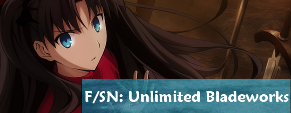


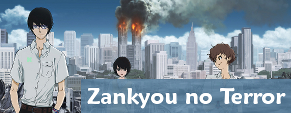
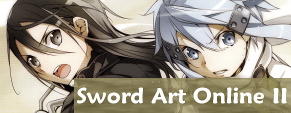



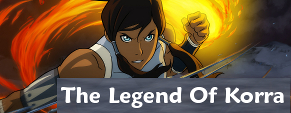
This anime seems quite interesting, especially the authenticity of my date back to some of the scenes after scenes, arigato:)
LikeLike